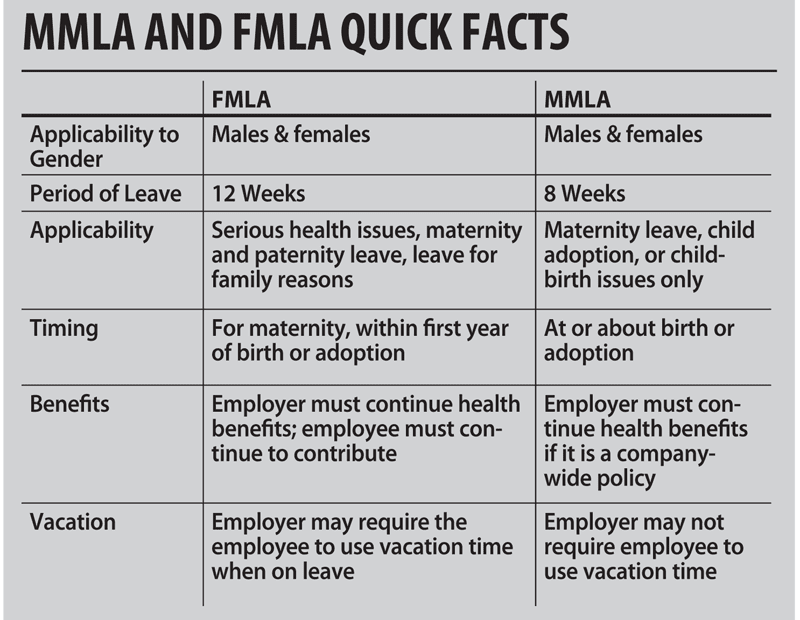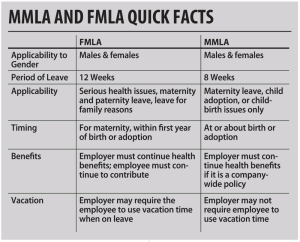
The Expectant Employer
Understand Your Obligations for Maternity and Paternity Leave
At any given time, a female employee may approach you and share the wonderful news that she is pregnant. Similarly, a male employee may approach you with the news that he is going to be a father.While such news is usually well-received, it also serves as notice that you, as the employer, should begin making preparations for your employee’s maternity or paternity leave. You must be mindful of both state and federal law.
The Massachusetts Maternity Leave Act
Under state law, the Massachusetts Maternity Leave Act (MMLA) applies to all businesses that employ six or more employees. As written by the state Legislature, the MMLA is gender-specific to females, and provides eight weeks of unpaid leave to full-time female employees for purposes of giving birth, adopting a child under the age of 18, or adopting a child under the age of 23 who is mentally or physically disabled.
The MMLA requires the employee to give her employer at least two weeks notice of her anticipated date of departure and intention to return. It should be noted that an employer cannot refuse to grant MMLA leave on the grounds that doing so would constitute a hardship.
The Mass. Commission Against Discrimination (MCAD) is the state’s chief civil-rights agency and is empowered with enforcing and overseeing the MMLA. As the chief enforcement agency, the MCAD has taken the position that the MMLA should be applied equally to both men and women despite it being gender-specific. In doing so, the MCAD effectively converted the MMLA to a paternity-leave act so that it would apply equally to men and women. Therefore, employers should treat both male and female employees equally under the MMLA when reviewing guidelines and leave requirements.
In a recent case involving a pregnant employee, the MCAD awarded an employee almost $25,000 in damages after finding that the employer had taken adverse employment action against the employee based on her pregnant status. In Sally Scaife v. Florence Pizza Factory, the MCAD found that, despite the employee’s positive work-performance reviews, the employer cut her hours upon learning that the employee was pregnant. The MCAD found that, as her pregnancy started to show, her boss reduced her work, stating, “it was bad for her and bad for the business” if she mopped or lifted. When she contested, her boss grew frustrated and reduced her hours, and finally told her “not to come in for the next shift because … she was too big.”
In another recent case involving the MMLA, the MCAD awarded an employee $111,300 in back pay and $35,000 in emotional-distress damages. In Patricia D. Kane v. College Central Network, the employee mostly worked from home, as one of 10 employees in a national company. In April 2000, she started working full-time as a regional manager, and she became pregnant in July 2001. She requested maternity leave, and was told that she “could take four weeks maternity leave and receive compensation equal to one week’s salary.” She made use of that time, and also took five sick days. In time, she became pregnant again, and was told that she “could take no more than four weeks of maternity leave and could not use any sick time toward her maternity leave.” The company president started to divert work from her and to pressure her to return as soon as possible.
Before she delivered her second child, she requested a full eight-week unpaid leave and a transition period of three days a week thereafter. She gave birth on Oct. 7, 2003, and started her leave. During that time, her boss took actions to remove her from the company, including stopping the lease payments on her car, shutting off her work cell phone, and replacing her name in the newsletter.
When she tried to come back to work, she found she was locked out of the intranet and e-mail. Her boss later informed her that her regional office was being closed and she was being laid off. Based on the employer’s conduct, the MCAD awarded the employee back pay and emotional-distress damages.
The Family Medical Leave Act
Under federal law, the Family and Medical Leave Act (FMLA) applies to businesses that employ more than 50 employees. The FMLA provides for 12 weeks of leave to an employee, regardless of the gender, for the birth and care of a newborn child or care for a newly adopted or foster child, or leave for a serious illness.
Leave can either be for paternity, maternity, or specified personal health reasons, depending on the needs of the employee. Under the FMLA, employees are eligible for FMLA benefits if they have worked for their employer for at least 12 months and at least 1,250 hours during the 12 months immediately preceding the leave, and they work within 75 miles of the location of the business.

A Case for Both MMLA and FMLA
As you can see in the chart above, some of the parameters of MMLA and FMLA seem contradictory. In addition, there are some circumstances where an employee may be entitled to 20 weeks of leave. These circumstances include a pregnant employee who has experienced complications and is on bed rest. During this pre-birth period, the employee can make use of her FMLA leave because she is experiencing a serious illness. Once the employee gives birth, she may then use her MMLA, because it applies only for the purpose of giving birth. Under these circumstances, the employer must comply with both FMLA and MMLA.
If you are unsure whether MMLA, FMLA, or both apply to your employee’s circumstance, and given the possibility of a discrimination claim, you should be sure to consult with a lawyer who concentrates their practice in employment law to be sure that you are in compliance with the law.
Kevin V. Maltby is an associate with Bacon Wilson, P.C. and a former prosecutor for the Northwestern District Attorney’s Office. He was named by SuperLawyers as a Rising Star from 2009 to 2011 in the field of employment and labor law, has extensive jury-trial and courtroom experience, and is an adjunct faculty member in the Legal Studies department at Bay Path College; (413) 781-0560; baconwilson.com/attorneys/maltby; bwlaw.blogs.com/employment_law_bits






